- Home
- Sonya Hartnett
What the Birds See Page 3
What the Birds See Read online
Page 3
“Can I try?”
His uncle proffers the glass: Adrian dampens a fingertip and presses it to the rim. At first the glass is mute as a fish; then, like a dog, it begins to howl. Its song summons goblins and worms from the ground. Adrian smiles, handing the glass back to his uncle. “That’s good,” he says.
“Were you spying on the new neighbours?”
The boy quails slightly. “No. I didn’t see anyone. Only light.”
“There’s people there, though.”
Rory puts the glass aside and Adrian follows him cautiously to the window. In the minutes that he’s had his back turned, darkness has come down. Nevertheless the pair of them peek through the blinds, Adrian at his uncle’s elbow. They can hear, drifting from the den, the theme tune of The Young Doctors, Beattie’s favourite programme.
“Mr Jeremio’s finally rented out the house.” Rory, home all day, has plenty of time to observe the happenings of the neighbourhood, although he would not say that doing so particularly amuses him. “They spent all morning shifting in.”
“Who are they?”
“I don’t know who, I only know what. There’s a man, and there’s some children.”
The news doesn’t please Adrian: he knows his grandmother will try to force an introduction and maybe even friendship, and Adrian’s shy soul rebels. He asks, “What about a mother?”
“A mother I didn’t see. The children were two little girls and a boy.”
Adrian sniffs, rubs his eyes with a pyjama sleeve. He is tired, and the information doesn’t sink in. His uncle must stare down at him and say, “That’s strange, don’t you think?”
“What’s strange?”
Rory sighs. “Concentrate, Adrian. Two girls and a little boy. Like those kids we saw on the telly.”
To Adrian, Rory’s reluctance to do anything except wander round the house is less a mystery than a fact of life – the boy knows his uncle’s lifestyle is unusual, but it’s never offended him. Adrian wants a calm and rosy world, he is prepared to accept anything, if anything is what keeps the peace. He isn’t old enough to understand that not all lifestyles are deemed acceptable to live. Rory’s sister Marta knows better – she is a woman who unfailingly knows better. Marta believes that her brother is doing nothing more dignified than malingering.
Only Beattie understands that Rory is hiding. Although her patience is tested by him, she understands that he stays indoors because if he went outside he would blow away on the lightest breeze, so excavated is he.
Rory’s father, just over one year dead, had been a prosperous accountant. He had known his spirited son would never join the family business, and indeed, when Rory finished school he had taken on a job at a local bottle shop. The young man had wanted money, a lot of it very fast, and his father, although wealthy, would give him none. The accountant knew that money shows its true worth only to those who earn it. But Rory thought his father tightfisted, he cultivated a grudge. He needed to show how much he despised every mundane principle that guided his father’s life. He worked day and night until he’d saved enough to buy the most wasteful thing he could think of, the single item most likely to appal his father’s utilitarian heart. On the day after his twenty-third birthday Rory bought a mustard-brown, silver-spoked, walnut and leather trimmed MG convertible.
Though it had been bought as a vehicle of resentment, the MG was the most gorgeous object Rory ever owned.
The car was almost two weeks old when Rory drove it at breakneck speed into a traffic-light pole. The tall pole had shuddered, its three blinkered lights flickering above the driver’s woozy head. Rory opened his eyes to see the bonnet of the MG, once as sleek and curved as the flank of a cat, snarling and torn as a dog in a fight. It was night, there were flashing lights, Rory was groggy but conscious, and for a minute he was alone. Once the minute passed there’d be eyes staring into his, hands reaching out for him, urgent voices in his ear. But he had a minute in which to exist alone, to hear a great silence within roaring noise, to crane his pounding head sideways on the creaking bucketseat, bitten tongue sponging the split in his lip.
His lifelong friend David was belted into the passenger seat. His head had been thrown back by the impact, so his nose pointed up like an arrow. A streetlight poured a misty beam over the young man’s face, which was unmarked, not even bruising. In David’s eyes Rory saw vacant places where David used to be. His face was so bland and shallow that Rory thought of the white interior of an empty and discarded bird’s egg. A cool wind rose and he thought of the life his friend no longer had in front of him, the woman he would not marry, the children he would not carry across the road, the old age he would not endure.
Footsteps were hurrying to the hissing, spitting MG when Rory saw David’s hand move spasmodically in his lap. David had only died on the inside.
His body would continue its outside work, breathing, pumping, squeezing, sighing. But still there would not be a wife, babies, old age. On the inside there would always be the whiteness of the empty eggshell.
Rory often thinks about his father these days – he misses David, but he misses his father more. His father had not been a cruel or petty or spiteful man, but he’d known, Rory suspects, what cruelty and petty spite can breed. To Rory they’d brought destruction and boundless waste. His friend, his father, himself; the future, the past.
His father lies under churned clay and soil. David lies under blankets that are dyed baby-blue. Each day Rory asks forgiveness from both of them. He knows the accident had sped the cancer through his father’s body, that his father was killed by the guilt he’d determined to carry. The crash had been, for the older man, a symbol of mistakes he had made.
With the death of Rory’s father had come other victims – Beattie, Marta, Adrian’s mother Sookie, Adrian, all of these now missing a fraction of themselves. Rory often thinks about David’s parents, growing sadly older as they nurse their inert son. The effects of what Rory did that night have sprayed out like acid rain.
There is no making amends for stealing life but Rory has given up much of his own vitality, as if trying to even the score. He has no desire, now, to truly live – none to participate, none to appreciate. Two years have passed since the collision, although the time seems longer. Rory is not the person he once was, and it’s getting harder to remember what that diminishing person was like.
Rory paints strange pictures now, he hears himself saying strange things. Occasionally he’ll be rude or nasty, unable to help himself – sometimes people have difficulty getting along with him. Rory hears things, he imagines things, some days he sees things scrabbling on his flesh. He prefers not to go outside. Like David, he is dead below the skin. His innards have been gutted, slashed, pulled about. Inside his chest is a cavern, and dripping slabs of muscle hang from his ribs like meat from butchers’ hooks. No one knows about this abattoir within his body – or maybe his mother does. No one except maybe Beattie knows that Rory needs to stay indoors watching the world through a window because, when he steps outdoors, the meat hanging on his ribs swings and sorrows with the wind.
At school the children are told they must not talk to strangers on the street. They are told that if they ever feel frightened by what a stranger says or does, they must run immediately to a parent or teacher or neighbour or shopkeeper, to anyone that they trust. The children sit quietly in their chairs, memorizing these instructions. One frightened girl begins to cry.
Adrian tells Clinton there are tenants in Mr Jeremio’s house, but such news is singularly uninteresting to a nine-year-old boy: enthusiastically caught up in the day’s football match, his teeth black with licorice, Clinton hardly listens. Adrian reddens, wishing he’d never said anything, wishing he could scratch the words out of the air. He feels sick with the thought that he has been boring. For long moments he dares not speak, staring intently at the ground.
All week the newspaper has nothing to say about the sea-monster.
Every night on television they show the scenes
of the crime. They show the house the Metfords live in, the streets along which the children walked. The milkbar has become famous. They show close-ups of the clothing and sketches of the Thin Man, the wanted man, the one with whom they wish to speak. Every night they ask for help. There’s nothing new to show or say.
Aunt Marta comes over for dinner, as she does once every week. Adrian sits alone in the den while his aunt, uncle and grandmother eat in the dining room. He hunkers close to the heater, its warmth radiating down his spine, playing idly with an old boardgame. It is a vaguely magical game in which a small plastic robot-man, when pointed at a question printed on the board, will swing around of its own accord and touch the corresponding answer with its wand. What are the three pure primary colours? Red, blue and yellow. Who carved the “Pietà”? Michelangelo (1475–1564, Rome, It.). Adrian tests the robot-man’s knowledge again and again, until it rocks unsteadily on its lead-weight base. Which is the world’s largest mammal? Blue whale. Who developed the theory of gravity? Isaac Newton. Mostly he can’t hear what the adults are saying, but sometimes Marta’s voice comes shrilling down the hall. She is never laughing – rather, he senses she is being thwarted, that she is lodging sharp protest. If he happens to be in the kitchen helping himself to ice-cream or to Beattie’s sultana scones he may hear his gran tell her daughter, “Quiet now, don’t get fussed.” Some nights, although not this night, Marta leaves in tears.
On Friday Adrian’s teacher announces that the class will be having a substitute teacher for the next fortnight. She is coy as to why this is, but Clinton reliably knows. Clinton’s mother is on the school board – she is the kind of pushy parent every school principal dreads – and uncovered the truth weeks ago. The teacher is getting married and afterwards going on a honeymoon. (“Someone must have money,” broadcasts Clinton’s mum; “You’re not going to Hawaii on a schoolteacher’s wage.”) Some of the girls devise a plan, and when the bell rings to mark the end of the day they make their teacher sparkle-eyed by hooting and whistling and throwing dabs of coloured paper into the air. Above their cheers can be heard the alarmed, piercing whinny of a horse.
That night on television three mannequins are shown dressed in clothes which match the ones the missing children wore. The mannequins stand rigid, casting angular shadows against a wall. Their faces are pretty but blank. The tallest one, Veronica’s, wears orange trousers and a handknitted vest; the sleeve of the skivvy is pulled up to expose, on the wrist, a tiny, inky, heart-shaped mole. The Zoe mannequin is wearing overalls on the bib of which is appliquéd a rampant purple kitten; the bare arms of the dummy look breakable, subjected to the cold. The last and shortest, Christopher, wears velour, a matching navy set, its feet encased inside a pair of stunted blue gumboots. The three mannequins are arranged side by side, and a tape measure, tacked to a wall, indicates their heights. Adrian is struck by their frozenness. The mannequins wear wigs of bulky fair hair and their skin is painted softly pink, their faces are dusted with makeup to give them colour, ivory teeth shine from between rosy lips, but still they look far from alive.
THREE
The first time Adrian sees her she is bent weeping over a bird. His grandmother has sent him outside to play, though it’s chilly and there has been rain – Gran seems to believe he’ll start to smoulder (self-combust?) if he stays indoors too long. He has noticed that she’s never concerned by the hours he must spend locked inside a classroom, but he keeps her contradictions to himself. He puts on a parka and his hands into his pockets and trudges down the drive.
The park is as empty as ever. He wonders about its perpetual state of desertedness – it feels like a forsaken place, a rejected one. He wonders if everybody knows a terrible truth about this land which he alone has not been told. Other times he fancies he is the only person who’s ever realized the park lies here, that he is a boy who knows where there’s hidden treasure.
The park is enclosed by the backsides of houses, by the dead-ended stump of road, by the fence of the local swimming pool. It is thickly planted with trees around the edges, while the centre is a broad grassy field. The wind sweeps the grass into rippling waves. The sunshine of the previous weekend had made the grass long and garish lime, and yesterday or the day before the council man has come to cut it. In summer, when the grass is dry, Adrian builds fragrant huts from armfuls of mown clippings; now, soggy with the beginnings of winter, the flecks of green stick to his jeans and clag in wads to the soles of his desert boots. Water squelches when he walks on the grass, threatening to soak through to his socks, so he sticks to the gravelly path which meanders along the outskirts of the trees and is dotted with little puddles, stamped with the pawprints of dogs.
He can feel how white the weather has made his face. The wind blowing against him is so cold that he can feel himself wearing his skin. Oddly, under his wild hair, Adrian’s ears feel stinging hot. He will walk three times round the oblong path and then go home and tell his gran it has started to rain, whether or not it had. He is not scared – the park is as familiar to him as his bedroom, as the private space beneath his bed, and he knows that nothing bad can happen to him here. If the Thin Man came, Adrian would simply run, and he wonders why the missing children had not done the same. He isn’t scared, but he’s bored and cold, and the fresh air is hard to breathe.
Because he’s walking with his eyes down, watching where he treads, he does not spot her until he is five or six paces away. Then, he gets such a surprise to see her that he’s pushed backwards a complete step. The girl is crouching on the path and her hands are pressed to her face; before her, where the grass meets the gravel, huddles a small brown bird. The girl is unashamedly crying, making a sodden but hearty noise. Adrian’s instinct is to flee, to turn on his heel and make a casual escape, pretending never to have noticed a thing. But the girl slides her hands from her cheeks and glares at him, and smears her nose with her sleeve. “You!” she says, aggressively accusing. “You have to help!”
He hesitates, blinking. He manages to ask, “What’s wrong?”
“This bird is sick. We have to put it somewhere safe. A dog will get it, or someone will tread on it, if we leave it here.”
She rocks on her haunches, her rucked coat lolling in the mud. Her face is florid and blotched with tears. She has long, jet-black hair which floats in untidy frizz, and eyebrows like two parties of Indians coming to pow-wow across a plain. She is not at all pretty, although Adrian is at the age where appearance plays no part in his attitude towards girls. He is wary of them all. “You pick it up,” she commands. “I’ll show you where to put it.”
He comes guardedly forward. The girl stands and steps away, swabbing her eyes with her coat hem. The bird is slumped against the gravel, wings folded loosely at its sides. The lids are drawn partway over its eyes. Closer, Adrian can see a ring of fluid around its head, a delicate ruby crown. It is breathing heavily enough to ruffle its soft breast feathers. “Pick it up!” the girl, behind him, snaps, making his heart jolt. “Be careful!”
Adrian takes his hands from his pockets, unfurling cramped fists. He slips his fingers beneath the bird’s body and feels the legs, like craggy twigs. The creature has no weight when he lifts it, it’s hard to believe it is cupped by his hands. The girl strikes out across the grass and he follows her into the urban forest, shielding the bird protectively. She is older and taller than he – Adrian supposes she is about eleven. By the trunk of a eucalypt she stops; at the foot of the tree there’s a tangle of weeds that have been kept dry by the high canopy. She kneels to inspect the site, which evidently satisfies. “Put it here,” she says. “It will be safe.”
Adrian has not taken his eyes from the bird. Its head has sunk, the beak sliding between his fingers. It has flown away, leaving feathers and bones in his hands. He thinks it is amazing that it should die so gently, without a sound. A bird is noise, until the end. The girl is still smudging tears from her face and he doesn’t want to tell her. He lowers the creature carefully amongst the weeds, and i
ts head sags to one side. He tries to straighten it with a finger, but the girl has already seen. “Oh,” she says, “it’s died.”
“Maybe it’s sleeping…”
“No, it’s dead. Poor little thing.”
Together they consider the corpse. Its feet are like mummified spiders. “Shall we bury it?” asks Adrian.
“Yes,” says the girl, “we must.”
They rummage for sticks to score the earth, which is riddled with tough roots and stones and as pliable as concrete: it is hot work digging the shallowest pit and their teeth clamp with the effort, their fingers cramp round the sticks. Close to the girl, he can smell the shampoo in her hair. Finally she sits back and, with a formal nod, directs that the funeral may begin. Adrian lays the bird in its undersized grave; already there’s an ant investigating the body. While he brushes dirt into place, the girl, fingers woven under her chin, chants an affecting prayer. “O bird,” she says, “take your love to the sky. Fly with the angels and Odin and Thor. Wait up in Heaven for me. Remember your life and those who have loved you and fly, fly.”
Adrian pats down the earth, which is serving its purpose imperfectly – flecks of brown feather show through. The girl shreds some grass and sprinkles it about and soon the grave is well-covered, camouflaged. The children stand, and Adrian recalls the cold; the girl has coaxed a sheen of tears into her eyes and now deals with it manfully, pinching her arm until the emotion is driven down. Adrian has never met anyone so impressive, and when she wanders back to the path he creeps after her, feeling himself at her mercy, expecting to be summarily dismissed. She has dried her face and her cheeks are no longer so mottled, but her voice, when she speaks, is damp and without gruff. “It’s a tragedy when a bird dies, don’t you think?”

 Butterfly
Butterfly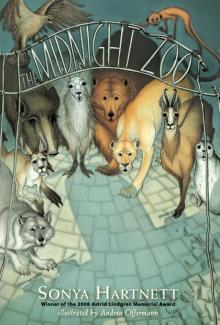 The Midnight Zoo
The Midnight Zoo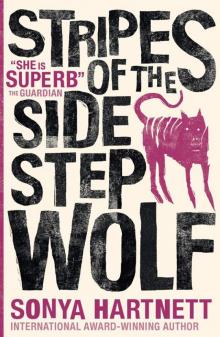 Stripes of the Sidestep Wolf
Stripes of the Sidestep Wolf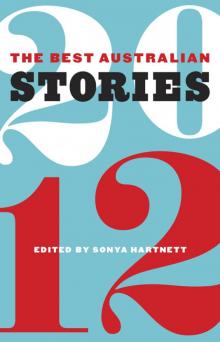 The Best Australian Stories 2012
The Best Australian Stories 2012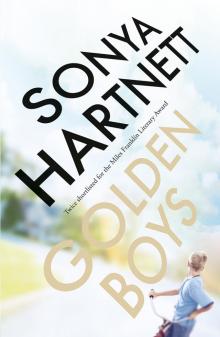 Golden Boys
Golden Boys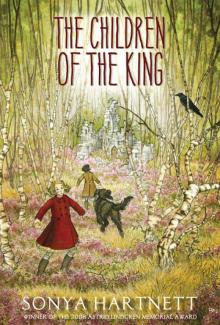 The Children of the King
The Children of the King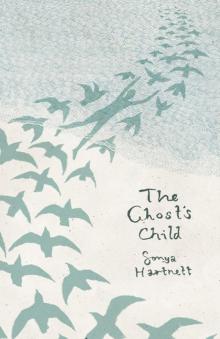 The Ghost's Child
The Ghost's Child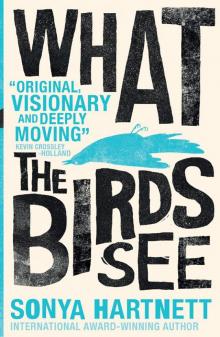 What the Birds See
What the Birds See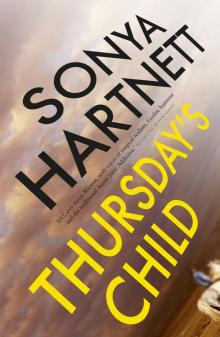 Thursday's Child
Thursday's Child